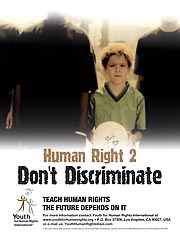|
Jordan High School in Watts Hosts
International Youth Summit
September 26, 2005
Young leaders from 30 countries arrive in Los Angeles this week to participate in the 2nd annual Youth for Human Rights International Summit, which takes place this year at Jordan High School.
The summit has been co-organized by Jordan High School and Youth for Human Rights International. It is the second annual international youth summit, the first of which was held in August 2004 at the United Nations.
Located in Watts, this high school, where racial tensions and street violence is all too routine, was selected for piloting a new human rights educational program compiled by Youth for Human Rights International.
The centerpiece of the program is the award-winning human rights rap music video, UNITED, which tells a story of a young boy confronted with gang members on a basketball court. He rallies the children of the world to help him stand up for his human rights. The video received top awards at the Colorado Moondance Film Festival, the New York Independent Film and Video Festival and the Taglio Corto Film Festival in Florence, Italy.
On December 10, 1948 the General Assembly of the United Nations adopted and proclaimed the Universal Declaration of Human Rights and 191 countries have accepted the document. Yet today, few individuals know it exists, let alone what is in the document or what the basic human rights are. Among other rights, the Declaration guarantees the rights of children and prohibits discrimination based on race, sex, color, national origin or language.
Jordan High counselor Al Johnson says, "By bringing together students of many diverse backgrounds it is our aim that we can come to some common understandings that will empower our students and will spark in them a desire to empower others."
This desire is echoed by a message posted on the UNICEF Voices of Youth website by three young Jordan High School students:
"Will there ever be 'peace on earth, goodwill toward men' with so much hatred toward one another? We feel there would be if more people would stop being ignorant, racist, and stereotypical. If more people would learn to see the 'content of their character' instead of the color of their skin, then people would be able to get along better."
For more information on the 2nd Annual Youth for Human Rights Summit see www.youthforhumanrights.org
|



